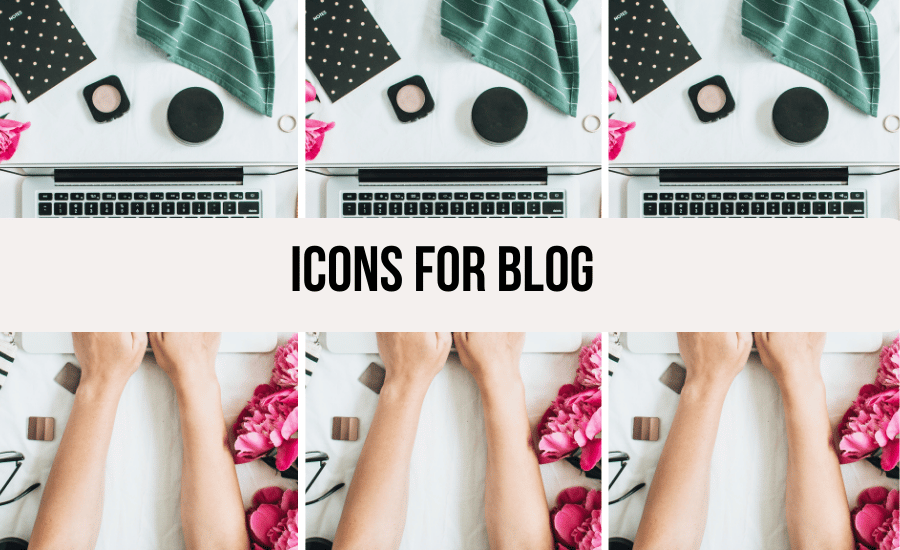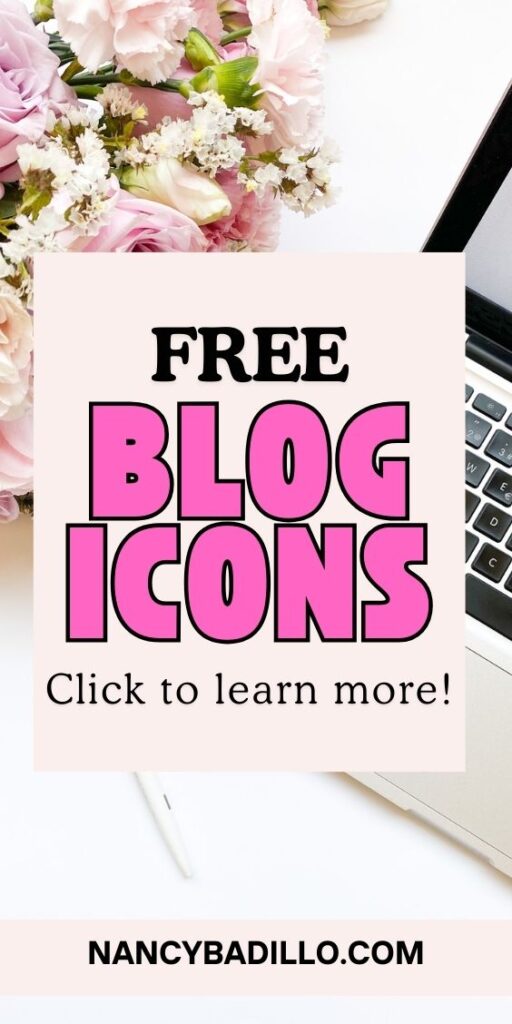I’ve been blogging since 2009, so trust me when I say your blog icon is a big deal. It might seem like a small detail, but your blog icon is often the first impression someone gets of your brand. It can play a critical role in setting you apart in a crowded online world. In the early days, I’d often overlook this crucial element but soon learned my lesson.
From brand recognition to visual appeal and even building a sense of community, I want to help you unlock the full potential of having a truly memorable blog icon.
This blog post is all about the importance of a blog icon.

DISCLOSURE: This is not a sponsored post. However, through my affiliate links, I may receive a commission if you decide to make a purchase, at no additional cost to you! Check out our disclaimer for more info on how it works
Table of contents
Why a Blog Icon Is Non-Negotiable
Before we go into detail on creating and using a great blog icon, let’s first cover why they’re so important to bloggers of any level. Having been in the blogging game for over a decade, here are a few reasons why a great blog icon should be at the top of your to-do list.
Building Brand Identity
Think of some of your favorite brands. What comes to mind? Chances are, their logo (which is just a fancy way of saying blog icon.) pops into your head right away.
That’s the power of a good blog icon: it becomes synonymous with your blog. A blog logo is a visual representation of what you and your blog stand for, helping you to build a distinct and recognizable presence in the digital space.
Visual Appeal
We live in a visual world, and people are naturally drawn to interesting and visually appealing things.
A free vector blog icon can catch a reader’s eye, making your content that much more clickable, especially when you consider how much competition there is. Your blog icon can reflect your niche, style, and attract the right audience.
Professionalism
When you’re just getting started as a blogger, it can feel like a lot. However, even if you aren’t a professional designer or have a huge budget, using a polished and high-quality blog icon can really elevate the professionalism of your site.
Just like we talked about, people connect more with visual elements. A professional-looking blog icon signals that you’re serious about what you do.
Where to Find Blog Icons?
1. Flat Icon
Flat Icon is an excellent resource for bloggers who are looking to enhance their website’s visual appeal without breaking the bank. It’s a platform that offers a vast collection of icons in various styles, sizes, and colors. Imagine stepping into an all-you-can-eat buffet, but instead of food, you’re greeted with endless possibilities for icons! Whether you need a simple camera icon for a photography blog or a cozy book icon for your literary adventures, Flat Icon has got you covered.

Using Flat Icon to find free blog icons is straightforward. Just head to their website and use the search bar to type in keywords related to your blog’s theme, like “travel” or “business.” Filter the results by selecting the “free” option; this will sort out the icons available for free download. You can then customize the colors and sizes to match your brand! Once you’ve selected and downloaded your ideal icons, simply upload them to your blog, and watch as your visual content comes to life—making your blog not just informative but also visually appealing.
Getting Creative: Types of Blog Icons
As a longtime blogger, I get that it’s tempting to just slap your initials together, pick a font and color, and call it a day, especially when you’re first starting out.
But your blog icon has the potential to be SO much more. It’s an extension of your blog and your creativity, so I encourage you to think outside the box. Explore your options within your business cards and content writing.
Illustrated Blog Icons
This option is great for lifestyle and personal brand bloggers, giving you lots of creative freedom. Whether you go whimsical and colorful, or minimal and elegant, an illustrator can capture the spirit of your blog in their design. Editable illustrations are great to make sure you have options.
Typographic Blog Icons
This style relies solely on typography to make a statement, perfect for minimalist design enthusiasts. Think carefully about font pairings. Look at contrasting styles: pair a bold, serif font like Playfair Display with a delicate and whimsical script like Parisienne. Or, use an uppercase sans-serif font for a more streamlined look. You can still have a great blog icon even if illustration isn’t your thing.
Abstract Blog Icons
As the name suggests, this approach takes a less literal, more symbolic approach. A carefully designed abstract icon can really intrigue viewers.
Tips for a Blog Icon That Pops
Now that you’re bursting with ideas on how to make a unique blog icon, I want to share some essential tips that have served me over the years. Remember these simple tips can make a HUGE difference in taking your blog icon to the next level. Make your privacy policy and affiliate programs cohesive with your branding by having a recognizable blog icon.
Keep It Simple
I’m all for being creative, but in this instance, simple is almost always better. I like to tell people to think about a catchy billboard: if people can’t figure out what it is in a matter of seconds, they’ll just keep scrolling.
Go for a blog icon that’s clean, easily recognizable, and visually impactful. Your blog icon needs to translate well even at smaller sizes.
Consider Your Color Palette
Don’t just go with your favorite color. Color theory can get kind of complicated, but thinking about a few basic questions can really set you on the right path.
What feeling do you want your brand to convey? For instance, blue hues are known for their trustworthiness, green is often associated with growth and harmony, and orange radiates warmth and creativity. Who is your target audience? Are you speaking to millennials, a more sophisticated and minimalist crowd or even an audience of foodies? These details can greatly influence which colors will appeal to your demographic.
Make It Scalable
In today’s digital world, you’ll likely use your blog icon across many different platforms from social media profiles to your actual website, even a favicon.
Because of that, it’s SO important to make sure it looks great big and small. You don’t want an icon that’s pixelated or unclear at smaller sizes.
Ask for Feedback
Sometimes as creative people, we can overthink things or fall in love with a particular concept and lose a little objectivity along the way. It can be extremely helpful to get feedback from your audience, whether that be friends and family or, better yet, your followers.
You’ve spent a lot of time working on your blog icon. This is a great opportunity to not only gather important feedback but also build excitement.
Finding and Hiring a Blog Icon Designer
Not all of us are blessed with mad design skills. Trust me, I’ve had my fair share of “Pinterest Fails”. Fortunately, there’s absolutely no shame in getting professional help to elevate your blog to the next level.
A well-designed blog icon is an investment, and hiring an experienced designer doesn’t have to break the bank.
Working with Freelancers
Hiring a freelancer to create your perfect blog icon is one of the more popular choices for design projects because there’s a much higher likelihood of getting exactly what you want. Freelance marketplaces like Fiverr can connect you with thousands of talented individuals who provide free SVGs and media icons.

When it comes to crafting a unique brand identity, I don’t recommend using a logo from Canva, and here’s why. First and foremost, Canva is an incredibly popular design tool, which means that countless businesses and individuals are likely using the same templates and design elements. This oversaturation can make it challenging for your brand to stand out in a sea of similar logos. Just imagine walking into a room full of identical twin outfits – it becomes difficult to distinguish one from another!
Moreover, while Canva offers “Pro” elements for those who pay for their subscription, you cannot trademark any logos designed using these elements. This means that if you happen to choose a logo that is both stylish and popular, you run the risk of legal complications down the line. Creating a logo from scratch not only gives you complete ownership, but it also allows for a unique expression of your brand’s personality and values. In a competitive world, investing in a custom logo will help you establish a strong brand identity that truly separates you from the crowd.
Exploring Design Contests
If you have a little wiggle room in your budget, running a design contest can give you a diverse range of design concepts and ideas that you can provide detailed feedback on.
Think about it as curated crowd-sourcing, getting high-quality custom designs without the stress of endless emails back and forth.
Vetting Your Options
No matter which route you choose (freelancer versus design contest), it’s super important to have a solid system to help you choose the right candidate. Look through their portfolios for designs that are in line with your style. Also, make sure you read reviews. Testimonials speak volumes.
Where Does a Blog Icon Live On Your Website
The technical side of websites can be intimidating even after 15 years of blogging.
But fear not. Most content management systems have made things like adding a blog icon fairly straightforward. These vector collections make your site work a breeze.
Your Website Header
Think about those high-converting websites you love, the ones with exceptional user interfaces. Your site header is prime real estate – most visitors are instinctively drawn to this area. Using a blog icon here can greatly increase the likelihood of it becoming easily recognizable.
Favicons
Favicons are the unsung heroes of the design world. You know that little icon you see up in a browser tab? Yup, that’s it. Making it memorable by showcasing a smaller version of your main blog icon can enhance your brand identity. It’s such a simple touch that can really tie things together visually, giving your blog that polished look.
Since I am a personal brand and my blog is nancybadillo.com, I decided to create my favicon using Canva. I chose to create a simple yet effective design by using the initials of my blog, “nb.” This small icon serves as a visual anchor for my site and helps visitors associate it with my brand. Whenever someone spots my favicon in their browser, it’s a little reminder of my content, encouraging them to return for more insights. Making that extra effort for a favicon can elevate your online presence and keep your brand top-of-mind!
Here are the breadcrumbs to find it: Appearance > Customize > Site Identity > Favicon

Social Media
Building brand consistency is absolutely key if you’re serious about establishing a strong brand presence. Every time someone lands on your social media, whether that be Instagram, Pinterest, or YouTube, make sure to prominently feature your unique blog icon across all of them. Make sure to keep your blog icon consistent in size if you add one to your email signature, as well.
Conclusion
Creating and maintaining a strong brand as a blogger can feel like an uphill battle, but choosing the right blog icon shouldn’t be complicated. I always say, think about your blog icon as more than just a visual: it’s the face of your brand.
So whether you choose an eye-catching illustrated icon or something simple and typographic, take your time, think about what message you want to convey, who your audience is and remember, don’t be afraid to have a little fun with it.
Don’t let your blog icon be an afterthought because a memorable blog icon does more than just look good. This tiny visual acts as a powerful brand ambassador, so choose one that truly captures your blog’s essence and sets you apart from the digital crowd. Your icon library should be full of icons you can use throughout your website, but make sure your blog icon is the most prominent.
MORE RELATED POST:
- How to Use Instagram to Grow Your Blog Effectively
- Boost Your Blog’s Appeal with the Perfect Blog Icon
- How To Start A Blog – Your Step-by-Step Blueprint!
- Avoiding Amateur Blog Mistakes: 10 Tips to Thrive
- How To Write a Blog Post: A Beginner’s Guide
📌 Did you find this post helpful and inspiring? Want to come back to it later? Save THIS PIN to reference later!


+ show Comments
- Hide Comments
add a comment